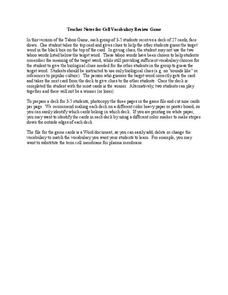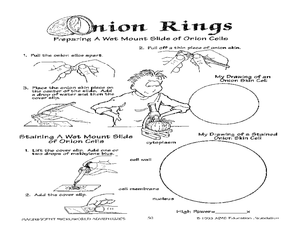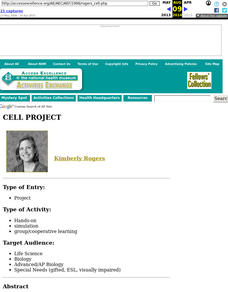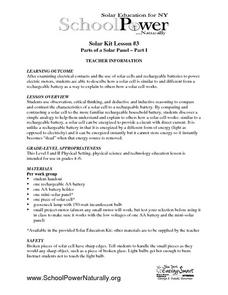Curated OER
Modeling Limits To Cell Size
Students participate in a 'hands-on' activity that simulates the changing relationship of Surface Areas -to- Volume for a growing cell. They assemble models of cells for comparison.
Teach Engineering
Pointing at Maximum Power for PV
Following detailed directions, teams collect the voltage and current outputs of a photovoltaic cell by adjusting the resistance. Using the collected data, they determine the highest power output. Implications for weather and a large...
BBSRC
Discovering DNA: The Recipe for Life
A pinch of adenine, a dash of thymine and ta-da, you have life! Well, it's not quite that simple, but through this series of activities and experiments young scientists learn about the structure of DNA and how it contains the recipe...
Bonneville
Three Ways to Generate Electricity
Get your hands on electricity. Pupils investigate magnetic fields and make the connection to generators in the fourth lesson plan in a series of six lessons on wind versus solar energy. Learners use a small electric motor as a generator...
Science Matters
Hierarchy
A system is only as good as the sum of its parts! Young scholars explore the components of the different body systems using a hands-on instructional activity. The instructional activity helps learners build an understanding that there is...
Serendip
Cell Vocabulary Review Game
Can science scholars describe a nucleus without mentioning DNA, or a chloroplast without mentioning the color green? Test their organelle understanding through an exciting card game. Groups take turns guessing the correct organelle or...
Curated OER
ABCs of Hydrogen and Fuel Cells
Students are introduced to the concept of hydrogen technologies through inquiry-based classroom activities.
Curated OER
A Hands-On Paper Activity Examining The Relationship Between Hierarchical Levels Of Structure And Function
Students investigate how complex functions arise in biological systems through the creation of several paper structures to accomplish various tasks such as remaining suspended in air for the longest time, making the loudest noise and...
Curated OER
Cell Types and Parts
Eighth graders, after creating a Venn Diagram comparing/contrasting animal and plant cells, writing ten similes describing cell types, or drawing a colored diagram of a cell, list cell types as well as describe and label cell parts. They...
Teach Engineering
Cell Membrane Experimental Design
Grandma said to gargle with salt water for a sore throat. Was she right? In the last part of the seven-part unit, lab groups design an experiment to test a cells reaction to salt solutions. The pupils conduct their experiment to answer...
Curated OER
Activities in A Science Classroom
Learning Through Games and Activities Make Staying On Task in the Classroom Fun
Purdue University
Design of a Door Alarm
How does electricity work? Budding scientists explore the concepts of electrical currents and open and closed circuits with class discussion and a hands-on activity using a battery to turn on a light bulb. Learners also make predictions...
Curated OER
Aluminum Adventure
Chemistry aces use an electrochemical cell to anodize a strip of aluminum. They apply an organic dye to it. In a practical application, they design a piece of jewelry out of the anodized metal and describe the process. Thorough notes...
Curated OER
Onion Cells
Students observe the cells of an onion by wet mounting it and viewing it in a microscope. In this hands on lesson students make their own wet mount slide of an onion and are able to identify the cells in it such as, the nucleus,...
Teach Engineering
Glowing Flowers
What a bright idea! Young scientists conduct an experiment on flowers to finish the last of a six-lesson unit on Cells. Putting the stems into dye-injected water and leaving it overnight results in flowers that glow. This is to simulate...
Teach Engineering
Quantum Dots and the Harkess Method
The Fantastic Voyage is becoming close to reality. The class reads an article on the use of nanotechnology in the medical field and participate in a discussion about what they read. The discussion method helps class members become more...
Teach Engineering
Copycat Engineers
It's often said that imitation is the sincerest form of flattery. Young engineers learn about biomimicry, which uses nature to generate engineering ideas, in the fifth instructional activity of nine in a Life Science unit. Working in...
Bonneville
Phone Charger Efficiency
Be efficient in learning about efficiency. A fun hands-on activity has pupils calculate the efficiency of cell phone chargers by measuring the power in and power out. They also learn how to read and use circuit diagrams.
Curated OER
Cell Project
Students investigate cells. They discover what cells are, where they are found, what they do and what they are made of. They construct a giant cell that is posted on the bulletin board.
Curated OER
Can You Hear Me Now? A Study Unit on Cell Phones
In this comprehensive reading comprehension instructional activity, students complete an indepth look at the introductions and history of cell phones. Students research, analyze and determine the answers to twenty two questions regarding...
Curated OER
A Honey of a Hexagon
Learners explore how bees make honey and why the hexagon is the best basic pattern for the honeycomb through the use of a video and hands-on activities with honeycombs and geometric shapes.
Curated OER
Two-Cell Battery
Students build their own two-cell battery and determine which electrolyte solution is best suited for making a battery. They discuss background information for their experiment, construct and test their battery, and using the chart on...
Curated OER
Parts of a Solar Panel-Part I
Students examine electrical contacts, solar cells, and rechargeable batteries and compare and contrast the characteristics of a solar cell to a rechargeable battery in a hands-on activity. Students complete a worksheet as they...
Serendip
DNA Structure, Function and Replication
Before a cell replicates, its DNA must replicate. Take advantage of a hands-on guided activity to teach budding scientists how this happens. Using a set of nucleotide cards, learners become the DNA and work to create matching strands...

























